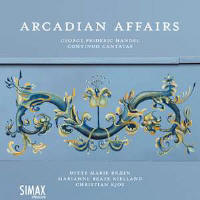Texte paru dans: / Appeared in:
|
|
|
Outil de traduction (Très approximatif) |
|
|
Reviewer:
David Vickers The harpsichordist Christian Kjos presents five continuo cantatas composed in Italy between late 1706 and early 1710. Nice, che fa? Che pensa? and Lungi dal mio bel nume are bona fide rarities with just one obscure previous recording apiece. On the other hand, the intensely dramatic masterpiece La Lucrezia has a large and diverse discography. Kjos accompanies Norwegian compatriots Ditte Marie Bræin and Marianne Beate Kielland without the usual panoply of additional continuo instruments (cello, theorbo and so on); his elaborate countermelodies and unusually rich harmonic ideas are informed by treatises by Handel’s contemporaries Heinichen and Mattheson that discuss extemporised harpsichord continuo embellishments, describing that skilled harpsichordists improvised to a significant level of complexity over the top of the notated bass line. Extracts from Handel’s keyboard pieces serve as introductory preludes to three of the cantatas, whereas playing in recitatives is modelled after the composer’s own late-1730s notation of rich chords in his rearrangement of Crudel tiranno amor, HWV97b. The results often resemble obbligato harpsichord parts rather than discreet chordal support and challenge preconceptions about how this repertoire can be played, but the transparency of a fine copy of a late 17th-century Florentine instrument never risks an overload of density and the accompaniments never detract from the singers. Bræin sings with unaffected purity in Nice, che fa? Che pensa?, the brief yet lovely Chi rapì la pace al core? (Kjos’s imaginative realisation and passing dissonances fitting the tormented final aria like a glove), and Lungi dal mio bel nume; her ornamentation is graceful and she has an admirably neat trill, even if emotional storytelling is a touch cool. There is plenty of expressive warmth and Italianate fluency in Kielland’s lyrical Fra pensieri quel pensiero (introduced by the Sonata in G minor, HWV580), and she conveys the bitter poignancy, furious vigour and tragic pathos of a rape victim’s suicide in La Lucrezia – this compelling interpretation by just two accomplished musicians performing at low Roman pitch (A=392) is the total antithesis of Raymond Leppard’s orchestral rearrangement for Janet Baker’s iconic recording that held sway for so long. |
|




